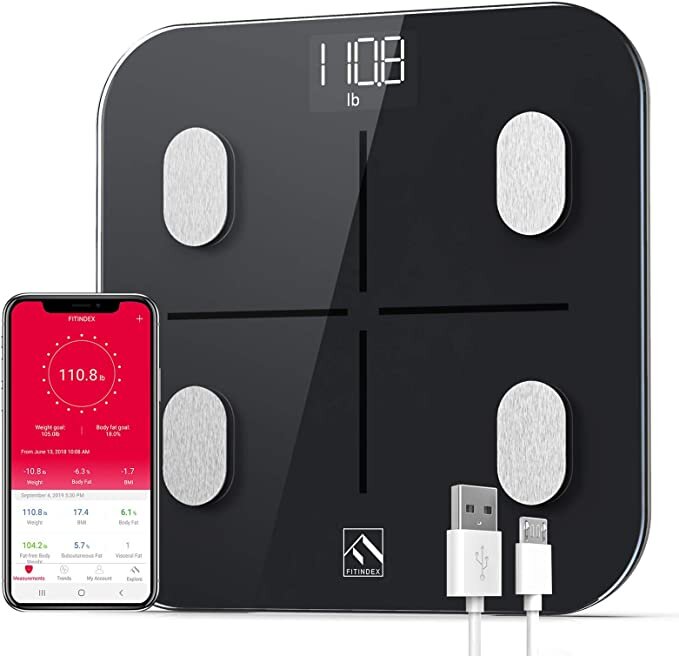Nutrition & Life-Style Modifications can improve or reverse health conditions associated with weight gain. Sometimes you need support…
Obesity
Type 2 Diabetes
High Blood Pressure
High Cholesterol
Metabolic Syndrome
Cardiovascular Disease
Non-alcoholic fatty liver disease
GERD
IBS / IBD / Crohn’s
Insulin Resistance / Pre-diabetes
Cancer
Chronic Musculoskeletal Pain
Degenerative Disc Disease
Osteoarthritis
Rheumatoid Arthritis
Fibromyalgia
Plantar Fasciitis
Sleep Apnea
Asthma / Allergy
Depression
Anxiety
Adrenal Stress or Fatigue
Getting Started
The best foundation to beginning your journey towards weight loss is understanding the what, why and how behind our bodies burning fat, along with the process of monitoring our progress. This is what we call Body Composition Analysis which is how our personalized plans begin. See below to read the considerations and information we assess throughout your journey.
WHY MONITOR BODY COMPOSITION?
Body composition monitoring gives you an insight into key health indicators that will enable you to monitor the impact of changes to your lifestyle:
See the impact of a change in diet on the body to make sure you are dieting a healthy way
Fine-tune your fitness program by monitoring progress of muscle mass and Basal Metabolic Rate
Monitor the level of visceral fat, which has been linked as a possible risk factor for developing Type 2 diabetes a factor in heart disease.
Set a target for your physique and monitor your progress towards it.
HOW DOES A BODY COMPOSITION MONITOR WORK?
Body Composition Monitors calculate your body composition using Bio-electrical Impedance Analysis (BIA). Safe,low-level electrical signals are passed through the body via the footpads on the monitor platform. It is easy for the signal to flow through fluids in the muscle and other body tissues but it meets resistance as it passes through body fat, as fat contains little fluid.
This resistance is called impedance. The impedance readings are then entered into medically researched mathematical formulas to calculate your body composition. Some monitors are also equipped with an athlete mode for adults with athletic body types: this would be a person involved in intense physical activity of approximately 10 hours per week with a resting heart rate of 60 beats per minute or less. Individuals who have been an athlete for a number of years but currently exercises less than 10 hours per week should also use athletic mode. Otherwise, activity levels are rated on a scale from 1 (sedentary) to 3 (active).
Click here to purchase: https://amzn.to/3pXTBYg
THE BEST TIME TO MONITOR BODY COMPOSITION:
Your body water levels naturally fluctuate throughout the day and night. Any significant changes in body water may affect your body composition readings; for example, the body tends to be dehydrated after a long night sleep so if you take a reading first thing in the morning your weight will be lower and your body fat percentage higher. Eating large meals, drinking alcohol, menstruation, illness, exercising, and bathing may also cause variations in your hydration levels. Note: To get the most reliable reading it’s important to obtain a body composition reading at a consistent time of day under consistent conditions.Taking a reading before a midday or evening meal is suggested.
WHAT IS BODY FAT PERCENTAGE?
Body fat percentage is the amount of body fat calculated as a proportion of your body weight. Reducing excess levels of body fat has been shown to reduce the risk of certain conditions such as high blood pressure, heart disease, diabetes and cancer.
WHAT IS TOTAL BODY WATER PERCENTAGE?
Total Body Water Percentage (TBW%) is the total amount of fluid in a person’s body expressed as a percentage of their total weight. Water plays a vital role in many of the body’s processes and is found in every cell, tissue and organ . Maintaining a healthy total body water percentage will ensure the body functions efficiently and will reduce the risk of developing associated health problems. Your body water levels naturally fluctuate throughout the day and night. Your body tends to be dehydrated after a long night and there are differences in fluid distribution between day and night. Eating large meals, drinking alcohol, menstruation, illness, exercising, and bathing may cause variations in your hydration levels. Your body water percentage reading should act as a guide and should not be used to specifically determine your absolute recommended total body water percentage.
Please monitor all readings over time to track the relative change. The total body water percentage will tend to decrease as the percentage of body fat increases. A person with a high percentage of body fat may fall below the average body water percentage. As you lose body fat the total body water percentage should gradually move towards the typical range given above.
WHAT IS VISCERAL FAT RATING?
This feature indicates the rating of visceral fat in your body. Visceral fat is the fat that is in the internal abdominal cavity, surrounding the vital organs in the trunk (abdominal) area . Research shows that even if your weight and body fat remains constant, as you get older the distribution of fat changes and is more likely to shift to the trunk area especially post menopause.
Ensuring you have healthy levels of visceral fat (Rating <12) may reduce the risk of certain diseases such as heart disease, high blood pressure, high cholesterol, type 2 diabetes and fatty liver disease.
WHAT IS BASAL METABOLIC RATE (BMR)?
Your Basal Metabolic Rate (BMR) is the minimum level of energy your body needs when at rest to function effectively including your respiratory and circulatory organs, neural system, liver, kidneys, and other organs. You burn calories when sleeping. About 70% of calories consumed every day are used for your basal metabolism. In addition, energy is used when doing any kind of activity, generally, the more vigorous the activity is the more calories are burned.
This is because skeletal muscle (which accounts for approximately 40% of your body weight) acts as your metabolic engine and uses a large amount of energy. Your basal metabolism is greatly affected by the quantity of muscle you have, therefore increasing your muscle mass will help increase your basal metabolism. Having a higher basal metabolism will increase the number of calories used and help to decrease the amount of body fat. A low basal metabolic rate will make it harder to lose body fat and overall weight.
WHAT IS METABOLIC AGE?
Metabolic age is calculated by comparing your BMR to the average BMR of your chronological age group. The number indicates the average age associated with that type of metabolism. If your BMR Age is higher than your actual age, it is an indication that you need to improve your metabolic rate. Decreasing body fat while maintaining or building healthy muscle tissue will improve your metabolic age.
WHAT IS MUSCLE MASS?
This feature indicates the weight of muscle in your body. The muscle mass displayed includes the skeletal muscles, smooth muscles (such as cardiac and digestive muscles) and the water contained in these muscles. Muscles play an important role as they act as an engine in consuming energy. As your muscle mass increases, your energy consumption increases helping you reduce excess body fat levels and lose weight in a healthy way.
WHAT IS BONE MASS?
This feature indicates the amount of bone (bone mineral level, calcium or other minerals) in the body. Research has shown that exercise and the development of muscle tissue are related to stronger, healthier bones. While bone structure is unlikely to make noticeable changes in a short period, it is important that you develop and maintain healthy bones by having a balanced diet and plenty of exercise. People worried about bone disease should consult their physician. People who suffer from osteoporosis or low bone densities due to advanced age, young age, pregnancy, hormonal treatment or other causes, may not get accurate estimations of their bone mass.
Individual Plans
Identifying factors contributing to your weight gain or difficulties losing is the basis for your personalized treatment plan.
Comprehensive evaluation of medical history, symptoms and laboratory findings
Past Weight management experience
Discussion of social, emotional, behavioral considerations
Readiness assessment - what do you feel ready to work on at this time?
Body composition analysis
Diagnosing possible causes for your weight gain or weight loss resistance
Medication prescription for appetite suppression and/or blood sugar regulation
Nutritional supplement recommendation
Nutrition plan
Shopping lists, food & recipe guides
Exercise recommendations
Ongoing evaluation, education & support based on your individual needs
Personalized Nutrition
A thorough evaluation of your health status, weight loss history, and current lifestyle, is the basis for a nutrition plan formulated just for you. Together we create a plan that you feel ready to follow, which takes into account your preferences and goals. Options for strategies to help you stay on track are discussed and modified as needed.
All plans:
Are created using evidence based science on how the balance of nutrients affect your health
Provide nutrients your body needs from healthy foods you enjoy
Emphasize choosing whole food, some organic and locally sourced
May include recommended brands and where to find them
Feature flexible options
Include recipe recommendations
Adapt per your needs and progress as you go
May include combinations and variations of science based dietary principles:
Mediterranean Diet
Low Carbohydrate or Very Low Carbohydrate
High Protein Ketogenic
High Fat Ketogenic
Anti-inflammatory
Paleo
Vegetarian
Pescatarian
Vegan
Calorie Deficit
Intermittent Fasting
Weight Loss Support & Enhancement
Weight loss and your personal journey towards a healthier lifestyle can be approached through a variety of support types and personal regimens. The content below lays out pathways that may be considered for your personal plan to assist you toward your weight loss goals.
Medication
While medications are not required to lose weight, some people find them helpful to support following a recommended plan. Health status and history, current medications, and laboratory findings are important considerations in discussing pharmacological support.
Medication to Help Manage Eating Behaviors, Improve Glycemic Control & Promote Fat Loss
Saxenda / Victoza
Wegovy / Ozempic
Zepbound / Mounjaro
Generic Semaglutide and/or Tirzepatide
Phentermine
Phendimetrazine
Topiramate
Qsymia
Contrave
Metformin
Others
Supplements
Nutritional supplements may be recommended to optimize metabolism and gastrointestinal health or correct imbalances. Considerations include laboratory findings, symptoms, and weight loss progress. Some of the supplements we may discuss include:
Probiotics
B Vitamins
Multivitamins
Minerals
Omega 3s
Amino acids
We partner with FULLSCRIPT to provide you with professional-grade supplements. Click the logo to shop our recommendations:
Lipotropic Injections contain natural ingredients that may aid in the reduction of fat tissue by boosting the body’s normal metabolic functions.
Pyridoxine (B6): Promotes red blood cell production and converts food to energy.
Methionine: Helps break down sugars & carbohydrates and convert to energy.
Inositol: Converts food to energy.
Choline: Healthy nerve cells, cuts muscle recovery time, helps convert fat to energy
Hydroxocobalamin (B12): Energy, healthy nerve cells.
Carnitine: Building block for proteins, helps body burn fat as fuel
Thiamine (B1): Improves immune system, helps convert fat & carbohydrates into energy
Riboflavin (B2): Increases metabolism, supports immune system
Vitamin B 12
B12 Methylcobolamin
B12 Hydroxacolobalamin
Lipo-Trim-Spray
Sublingual spray avoids the need for injection
Some individuals find there is a similar effect & benefit as with injectable form
Acetyl-L-Carnitine | Methylcobalamnin | L-Leucine | L- Arginine | Inositol | L-Methionine | Betaine | Thiamine | Folic Acid
Exercise
Regular exercise can help remodel your metabolism so your body burns more fat. Maintaining and toning muscle can increase calorie burning and make your clothes fit better. It is a powerful method to reduce stress, improve sleep, and promote a feeling of well-being. It often serves as a motivator to lose more weight. Sometimes a prescription may help to cover expenses. Methods we may discuss include:
Cardio work-outs
Strength training
High Intensity Interval Training
Water exercises
Physical therapy
Personal training
Work-out Nutrition
Cognitive Behavioral Therapy
When it comes to changing behavior, especially long-term, habitual patterns, getting yourself to do something different, even when you know it’s good for you, depends largely on what you tell yourself: that is, on your thinking.
Judith Beck
I offer guidance to help you:
Identify sabotaging thoughts, feelings and behaviors
Brainstorm strategies to change your thinking
Produce a tool-kit of strategies that work
























